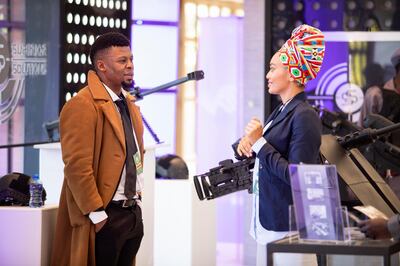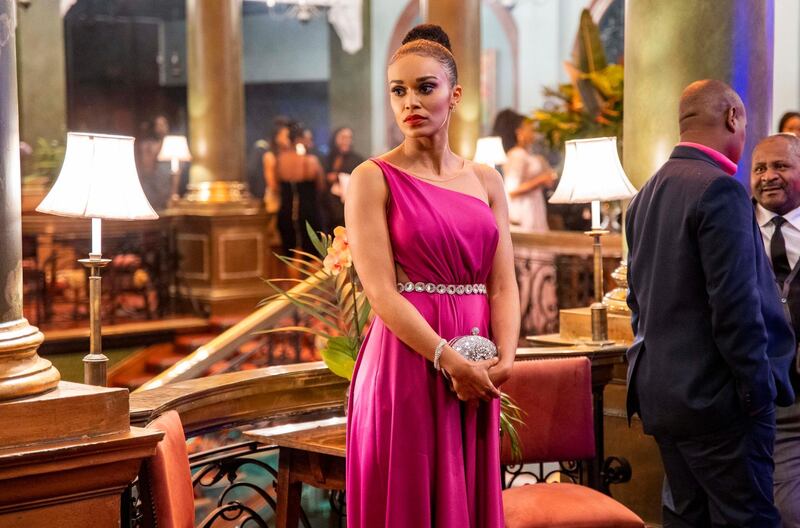As Netflix's first original scripted series from Africa, there was a huge amount of anticipation surrounding Queen Sono. Not only due to its setting, though. The fact its titular spy is female also suggested that it might subvert the genre and propel it into a modern era in a variety of unique and thought-provoking ways.
That's why it's such a relief that Pearl Thusi shines in the leading role. The actress immediately exudes an intellect and all-round magnetism as the titular character, who, over the course of six episodes, works alongside her highly skilled team to tackle a variety of dangerous missions across Africa. She also tries to contend with numerous changes in her personal life, in particular, new revelations regarding the mysterious assassination of her activist mother 25 years earlier.
Unfortunately, the mesmeric Thusi is about the only impressive aspect of the first two episodes of Queen Sono's debut season, as the show is repeatedly hampered by an atrocious script that is so uneven it repeatedly falls short of being captivating. The writing is so bad that even at its best it still feels dated, while at its worst, it's unbearable to watch.
This is all the more disappointing because Queen Sono actually starts off rather well. In the opening scene of its very first episode, entitled I Am Queen Sono, we see Thusi strolling along the luxurious harbour of Zanzibar City, then diving into the chaos and charm of one of the capital's thriving markets, all while working undercover to catch criminals.
Bringing such seldom-seen locations and characters to the worldwide audience Netflix has at its disposal is exactly why there was so much excitement surrounding Queen Sono. And it is authentically African, too. Not only was Queen Sono fully produced and shot in 37 locations on the continent, including Johannesburg, Soweto, Lagos, Kenya and Zanzibar, but it also has an all-African cast and crew. While the script is mostly in English, a variety of different languages, including Xhosa, Afrikaans, Zulu, French and Sepitori, are also spoken.

Though the first scene impresses, it doesn't take long for Queen Sono to go off the rails. We're immediately overburdened with too much backstory on Sono, none of which really lands, as it's delivered in such clunky fashion. By the end of the first episode, viewers will be lost and disinterested because of its haphazard and hackneyed approach.
Sadly, the second episode doesn't offer many improvements. In fact, things get worse, as the script adversely impacts the opening action scene, while even the manner in which the main villain of the series is revealed is done so tamely that you'll feel the urge to return to the main Netflix menu to find other entertainment.

But while first-time showrunner Kagiso Lediga, who previously wrote, produced, directed and starred in the romantic Netflix drama Catching Feelings – which also happened to star Thusi – might fail to get the full potential out of Queen Sono, certain aspects of the show still manage to appeal.
Some elements feel so fresh and vibrant it could have laid the foundations for Netflix's follow-ups from Africa to prosper. Even Queen Sono's brief glimpse at contemporary African stories and issues is fascinating, but they aren't explored in a compelling enough fashion – though it's undeniable that pretty much every aspect of its visuals, from costumes to production design to cinematography, glisten with beauty.
Thankfully, Netflix has huge plans for many more projects from the continent. Which is understandable, as it represents a growing market that could be stupendously lucrative for the streaming giant if it can attract audiences with specifically resonant and quality content. In the coming months, Queen Sono will be followed by South African teen drama Blood & Water and Mama K's Team 4, an animated show set in the future that revolves around four Zambian girls, while Netflix has also started to acquire and put more money into Nigerian cinema, known as Nollywood.
Fingers crossed these projects can learn from the mistakes of Queen Sono. Because, while it might be a misstep, it is still proof that stories from the continent need to be told and brought to a wider audience.
All six episodes of Queen Sono’s first season will debut on Netflix on Friday February, 28.






